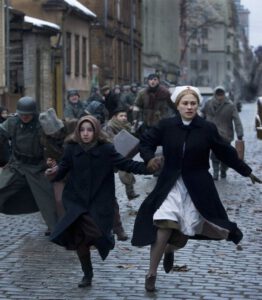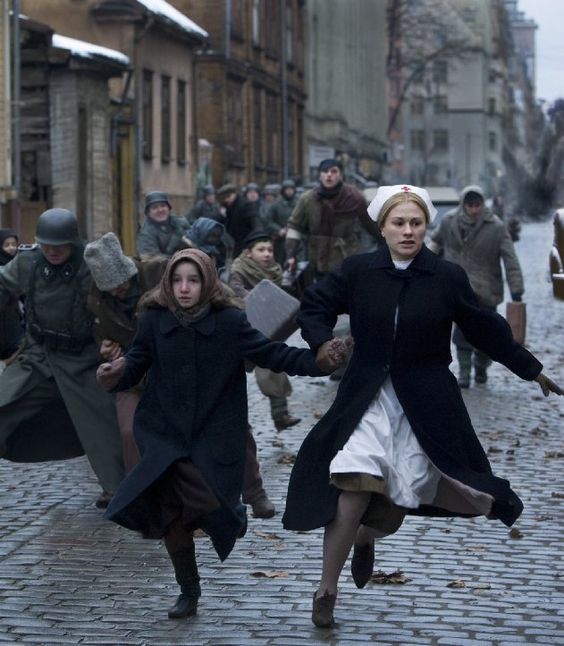Movie Info
Movie Info
- Director
- John Kent Harrison
- Run Time
- 1 hour and 35 minutes
- Rating
- TV-PG
VP Content Ratings
- Violence
- 3/10
- Language
- 1/10
- Sex & Nudity
- 1/10
- Star Rating
Relevant Quotes
Truly God is good to Israel,
to those who are pure in heart.
But as for me, my feet had almost stumbled;
my steps had nearly slipped.
For I was envious of the arrogant;
I saw the prosperity of the wicked.
For they have no pain;
their bodies are sound and sleek.
They are not in trouble as others are;
they are not plagued like other people.
Therefore pride is their necklace;
violence covers them like a garment.
Those who oppress the poor insult their Maker, but those who are kind to the needy honor him.

Fred Rogers famously advised that when terrible tragedies happen we should look for those who help others: such is the story of the brave Polish woman in this Holocaust film, directed by John Kent Harrison. At the opening of this film we read, “World War II rages through Europe. In occupied Poland, the Germans have established the Warsaw Ghetto for all the Jewish residents of the city. Over 440,000 Jews are forced inside its walls . . . There are some Poles who want to help . . . ”
Irena Sendler (Anna Paquin, as good here as she was in The Piano) is a Catholic Polish social worker in Warsaw who, unlike many of her fellow anti-Semitic Poles, is willing to reach out to Jews when the Nazis invade and occupy their nation. I find it amusing that this woman’s last name sounds similar to Oscar Schindler’s last name, but until I came across the film on YouTube (wonderfully crisp & clear!), I had never heard of her.
When the Nazis round up the Jews and force them into the Warsaw Ghetto, Irena’s fellow social workers are skeptical of her plan to continue to help them. She prevails, using forged papers that claim she is a nurse in order to gain entrance to the ghetto. Irena’s mother Janina Krzyżanowska (Marcia Gay Harden) is also fearful that her daughter is sticking her neck out too far. Irena, referencing her doctor father who treated Jewish patients, says, “I remember what Father used to say. You see a man drowning, you must try to save him even if you cannot swim.” Homebound due to poor health, Janina can only express her opposition in words, and eventually comes to support her daughter’s dangerous missions.
The Jewish parents are just as skeptical about turning over their children to her to be smuggled to safe havens. They are anxious that they will never see their children again—and with good reason, with so many called forth each day and sent forth on crowded trains to a mysterious destination. Some fear that their children, forced to memorize Catholic prayers and such to fool Nazi investigators, will forget their own faith. Irena strives to convince them that they must first concern themselves for the survival of the children. She promises that she will keep a record of each child and where he or she is being sent. Thus, we see her writing on small slips of paper and placing them inside large jars. These she buries in her yard. Nor is it easy to find sympathetic Poles willing to risk their lives.
The children also need convincing, as you can see in this exchange between the rescuer and a girl named Karolina Rozenfeld:
Why do I have to be a Jew?” to which Irena replies, “You were born into the Jewish faith.” The girl continues, “What if I want to be something else? I don’t like being hated by everybody.” Irena tries to reassure her, “Everybody does not hate you.” “Yes they do,“ the girl argues, “You know it’s true. What did we ever do? It’s not fair.” Irena can only agree at this point, “No, it’s not.”
Stefan Zgrzembski (Goran Višnjić), a Jewish friend from the time when they were at the university together, offers to assist her. He knows of a number of ways they can sneak the children out —by hiding some in wagons, others led through secret tunnels and sewers, still others by Irena walking them through the front door of the city hall. As they successfully smuggle children out, a romance develops between the pair, which will have a long-lasting effect. The Polish underground also comes to Irena’s aid with money and contacts—it too will powerfully affect the fake nurse’s future.
One segment I especially appreciated is the one featuring the person and work of Dr. Janusz Korczak (Krzysztof Pieczyński). He was a Jewish pediatrician advocating a child-centered method of education through books (some of these written for children) and radio broadcasts that made him famous throughout Poland. He headed up an orphanage of Jewish children, and when the children were sent to the Ghetto, he went with them, working hard to obtain food and clothing for them. When the order came to send the orphans away to a death camp, he insisted on accompanying them. An offer was made to save his life, but he refused to abandon his charges. The 1990 film Korczak goes into the details of the last years in the life of this brave and compassionate martyr. If you are inspired by actor Krzysztof Pieczyński’s depiction of this remarkable man in this film, you will want to see the earlier film on YouTube—it’s directed by the great Andrezej Wajda.
I hope you never experience Holocaust fatigue because of the vast number of such films available on so any venues. We do indeed need to member both the evil and the good of that era—the evil so we can say “Never again,” and the good so that we can continue the fight against anti-Semitism, still strong throughout the world. Director John Kent Harrison’s moving film was part of the Hallmark series shown on CBS TV, which means its depiction of Nazi cruelty might seem toned down a bit from other films of the Holocaust genre. Still, the torture scene when Irena is caught by the Nazis, is perhaps too graphic for young children, so parents should check it out before watching it with the whole family. The end titles present good news about Irena and Stefan, and there is a taped interview in which the real Irena pays tribute to the mothers who allowed her to take their children away to safety.
This review will be in the January issue of VP along with a set of questions for reflection and/or discussion. If you have found reviews on this site helpful, please consider purchasing a subscription or individual issue in The Store.

